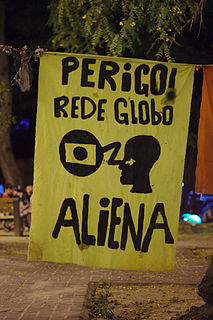 |
|---|
| This article is part of a series on the politics and government of Brazil |
| Foreign relations |
On October 23, 2005, Brazil held a country-wide referendum on article 35 of the Disarmament Statute to determine whether to approve or disapprove the article, which states in full, "The sale of firearms and ammunition is prohibited in the entire national territory, except to those entities provided in article 6 of this Law." ("Art. 35. É proibida a comercialização de arma de fogo e munição em todo o território nacional, salvo para as entidades previstas no art. 6o desta Lei." [1] ) The referendum failed by nearly ⅔ and that part of the statute was not enacted.

Brazil, officially the Federative Republic of Brazil, is the largest country in both South America and Latin America. At 8.5 million square kilometers and with over 208 million people, Brazil is the world's fifth-largest country by area and the fifth most populous. Its capital is Brasília, and its most populated city is São Paulo. The federation is composed of the union of the 26 states, the Federal District, and the 5,570 municipalities. It is the largest country to have Portuguese as an official language and the only one in the Americas; it is also one of the most multicultural and ethnically diverse nations, due to over a century of mass immigration from around the world.
A referendum is a direct vote in which an entire electorate is invited to vote on a particular proposal. This may result in the adoption of a new law. In some countries, it is synonymous with a plebiscite or a vote on a ballot question.

Ammunition is the material fired, scattered, dropped or detonated from any weapon. Ammunition is both expendable weapons and the component parts of other weapons that create the effect on a target. Nearly all mechanical weapons require some form of ammunition to operate.
Contents
The referendum and its date had been provided by the Disarmament Statute itself (art. 35, §1o). [1] During the drafting and development of the law, it had been decided that article 35 should be submitted to a referendum because of the importance of its subject. On July 7, 2005, the Federal Senate of Brazil promulgated legislative decree 780, which authorized the referendum. Article 2 of its decree stipulated that the public consultation should employ the following question: "Should commerce in firearms and ammunition be prohibited in Brazil?" ("O comércio de armas de fogo e munição deve ser proibido no Brasil?" [2] )













